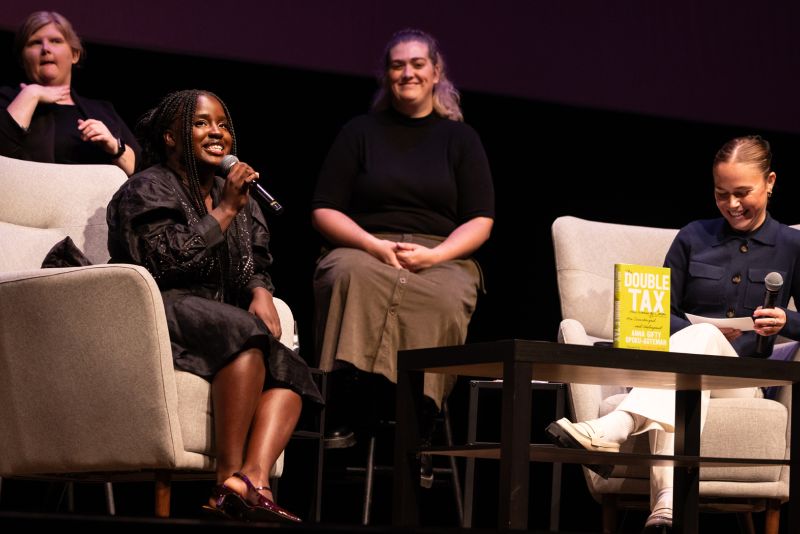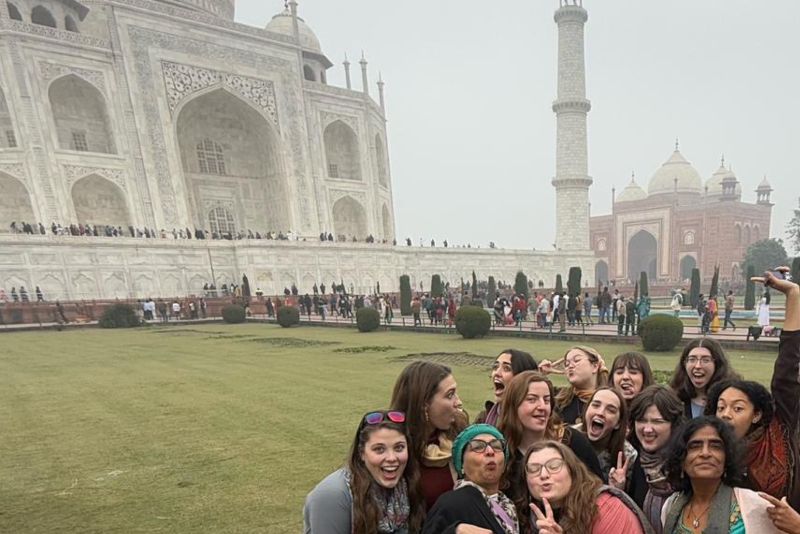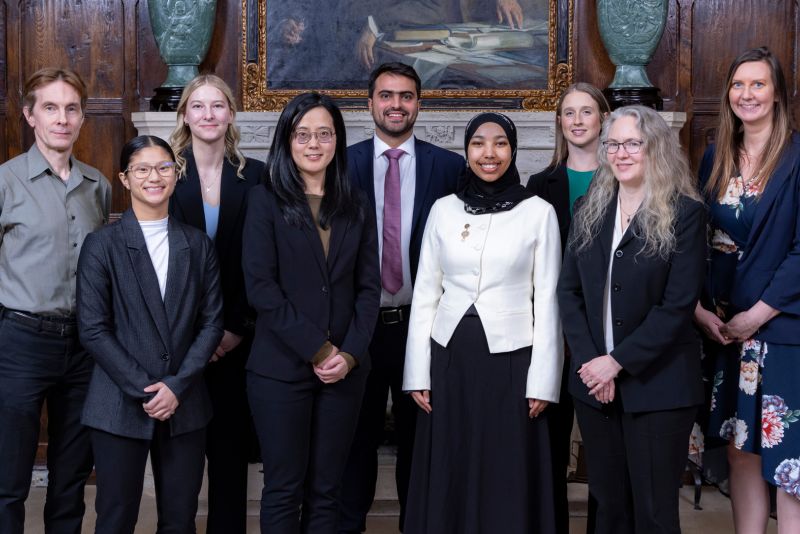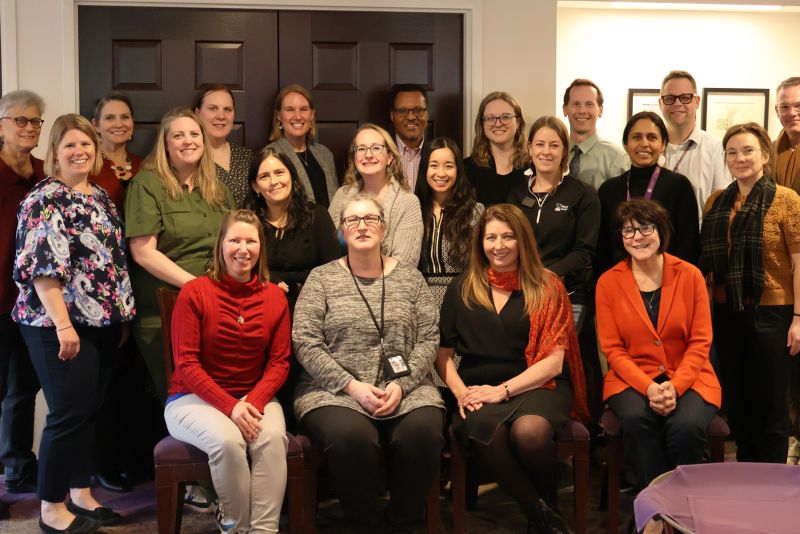
About the MCDE
The field of economics suffers from an underrepresentation of women and minorities that exceeds the more widely publicized underrepresentation in STEM fields. In Minnesota, 31% of economics students are women, and 12% are U.S.-born people of color (only 4% are U.S.-born women of color). Even more concerning, while STEM fields have seen improvement in representation over time, economics has not (Bayer & Rouse 2016, CSWEP 2018).
The Minnesota Center for Diversity in Economics (MCDE) ensures that people of all backgrounds lead and influence economic research and decision-making. The MCDE promotes and supports gender and racial diversity in economics at every educational and career pipeline stage.
The MCDE was recently featured on J-PAL's three part Diversifying Economics blog post.
Read all about it here: Diversifying economics, part three: The Minnesota Center for Diversity in Economics on its history, impact, and pursuit of collaboration
MCDE Initiatives

Design, implement, and study interventions targeted at women ages 16–20.
Recent research out of Swarthmore (Bayer, Bhanot & Lozano 2018) shows that low-cost information/email nudges can make a big difference in attracting and retaining women to the field of economics. The MCDE leads in efforts to implement this sort of outreach in Minnesota.

Engage women and underrepresented students in research.
Collaborative undergraduate research is a best practice for recruiting and retaining underrepresented students to economics. The MCDE provides research assistantships that study various issues of interest to the faculty and students who work with the Center.

Target teacher professional development.
Research shows that teachers pass math anxiety to their students akin to passing a virus. This relationship is particularly strong for female teachers and female students (Beilock, Gunderson, Ramirez & Levine 2010, Ramirez 2018). The same mechanism is likely at work in economics. K-12 teachers need to feel confident in their economic and personal finance knowledge and the Minnesota Council on Economic Education (with whom the MCDE is affiliated) is the only organization in the state focused on this key mechanism.

Forge partnerships with local/regional stakeholders.
The MCDE connects a range of stakeholders from the public and private sectors who are working to improve representation in economics and personal finance. By promoting opportunities to network and share across groups, the MCDE works to ensure that Minnesota’s students and teachers have access to the best possible set of resources.
MCDE Research
Virtually Nonexistent: Gender and Racial Representation in Online K-12 Economics Lessons
Abstract
Women and Black, Indigenous, and people of color (BIPOC) are underrepresented in economics. Among the factors contributing to the underrepresentation of these groups, past research has demonstrated a lack of diversity in introductory economics textbooks. We extend this research on representation to examples in economics lesson plans designed for K-12 audiences. We find that women and BIPOC examples are underrepresented. When present they are less likely to be economists, policymakers, or businesspeople. We also explore how author demographics predict the diversity of examples. Authors and teams that include women are more likely to use female examples.
Relevance, Belonging, and Growth Mindsets in Economics: Differences across Institution Types
Abstract
The underrepresentation of minority students and women in economics exceeds that of STEM fields, and while STEM fields have improved representation over time, economics has made less progress. Past research has established that under-represented minority and women students have significantly lower relevance, belonging, and growth mindset (RBG) in predominantly white institutions (PWIs) and co-ed settings (Bayer, Bhanot, Bronchetti, & O’Connell, 2020). Lower RBG is linked to worse grades and lower persistence in economics majors. There has been no research to date on RBG at minority-serving institutions (MSIs) or women’s colleges, nor on whether these identity-affirming institutions may foster RBG and persistence. This paper investigates RBG's role as a potential barrier or lever for change across different institutional settings. We find that minority students had significantly lower overall RBG ratings, as well as for each dimension of RBG. Female students did not have a significant difference in
overall RBG compared to male/non-binary students. Women did, however, have significantly higher relevance than their counterparts. These differences may be because students at women’s colleges, which we over-sampled, have significantly higher relevance than co-ed colleges. There is also some evidence that women have lower economics growth mindset, but that women’s colleges are associated with higher growth mindset in economics.
Persistence in Economics: Differences across Identities and Institutions
Abstract
Female and minority students are underrepresented in economics. This paper uses longitudinal data to explore students’ persistence and mindsets towards economics, and how they evolve over time. Analyses compare female and male/non-binary students, as well as minority-identifying and non-minority students, along with the potential role of identity-focused institutions (women’s colleges and minority-serving institutions) in shaping persistence in economics. Plans to persist in economics diminished over time, although less so for female students than male students and less so for minority students than non-minority students. Women’s colleges and MSIs did not lead to significantly different changes in persistence. Nor did changes in mindsets predict changes in persistence, although baseline mindset did predict baseline persistence.
Building Econometrics Skills and Confidence through Community-Engaged “Data Fest” Events
Abstract
This research describes a "Data Fest" approach that combines big data and social issues with a collaborative and community-engaged event. In this paper, we describe Data Fest and present quantitative and qualitative analyses from three years of pre- and post-surveys of Data Fest events. Changes from pre- to post-survey suggest Data Fest led students to build both economic analysis skills and their sense of relevance, belonging, growth mindset, and confidence. Student narratives illustrate the importance of a fun and supportive environment as well as the accountability to a community stakeholder as motivating their success and progress.

C-FEM: Cross Generational Female Economist Mentorship Program
An innovative mentorship program that connects female and non-binary/gender non-conforming economists at various stages in the economics education & career pipeline! Mentorship teams consist of members from each of the following groups: High school students, Introductory Economics college students, Economics majors, and Alumni. C-FEM participants will explore different economics topics and career options & will earn a certificate for each subject they master, drawing on their mentorship teams for support along the way.
We focus on recruiting girls/non-binary students and women of color, whose inclusion is desperately lacking in economics.
Interested in Becoming a Mentor or a Mentee? Please email MCDE@stkate.edu

Mentorship Collaboration Highlight
Libby Kula, Mentor (pictured left), Calyn Schardt, Student (pictured right)
MCDE Events

Data Fest
Data Fest is a modeled “Hack-a-thon” event that invites students from all academic backgrounds to work in groups to answer important socio-economic questions in collaboration with community partners. In past events, we’ve partnered with community organizations such as the Center for Indian Country Development and Ramsey County, using datasets from IPUMS and Opportunity Atlas. This is an opportunity for students to explore analyzing data and a chance to learn more about R and Stata software coding in a hands-on environment with peers.
We hold two separate Data Fest events in February and May, giving participants the opportunity to use more of the skills they have gained in their courses. Students, faculty, staff, and alumni are welcome to join us! If you are interested, please look forward to more information coming in February.

NSF Funded Research Project - Relevance, Belonging and Growth Mindset (RBG) Mini Conference
A collaborative research team from St. Catherine University and Metropolitan State University hosted a one-day mini-conference presenting and discussing results. The conference included networking, sharing of experiences, and capacity building to encourage future research and teaching collaboration. Anyone interested in the RBG research is encouraged to read the two working papers and download the anonymized data.
Past Events
- PBK Visiting Scholar: Dr. Trevon Logan Public Lecture, September 18, 2023
Dr. Pavcnik's public lecture - October 3rd, 2022
Gender Gaps and Social Norms - September 22nd, 2022
Program Evaluation and Design - April 27th, 2022
Graduate School Alumni Panel - April 21st, 2022
Impact of Contraceptive Access on High School Graduation - April 13th, 2022
Inclusive development, project evaluation, and the connection between micro and macro policies - April 5th, 2022
Black Lives Matter's Effect on Police Lethal Use-of-Force - March 15th, 2022
Collective Bargaining Rights, Policing, and Civilian Deaths - March 9th, 2022
Economics of Sex and Love - March 8th, 2022
Stata Basics Workshop - February 18th, 2022
The Impact of Equity Premiums on the Completion Outcomes of Minority Students - February 16, 2022
LinkedIn and Resume Building Workshop - February 3, 2022
Reparations and the Missing Debt Owed - November 17, 2021
Gender Disparities in Healthy Aging: A cross-national comparative study in the United States and South Korea - November 12, 2021
Rent Control Debate - October 26, 2021
The Effect of Racial Covenants on Modern Day Foreclosures: Evidence from Hennepin County - October 21, 2021
Queer-Nomics- June 28, 2021
Evaluation Capacity Building- May 05, 2021
Life After St. Kates: What are Skate's Alum doing with an Economics and Political Science degree?- April 19, 2021
Money Moves: A financial literacy event- March 03, 2021
Liberal arts education and environmental policy- a conversation with an Alumni- February 05, 2021
Water Quality Awareness And Breastfeeding: Evidence of Health Behavior Change In Bangladesh - January 25, 2021
The Economics of Race and Identity - December 1, 2020
What are the Economic benefits to Immigration? - November 10, 2020
Era for Virtual Schools - October 15, 2020
Building Credit as a Muslim American- September 15, 2020
Mapping Prejudice: Housing inequality in Ramsey county event- August 14, 2020
Brown bag undergraduate summer research- July 23, 2020
Economic Protest Event — June 29, 2020
Discussion of Poverty, Inc. with the Filmmaker — June 11, 2020
Socialism vs. Capitalism Virtual Debate — May 13, 2020
A Rising Mountain of Student Loan Debt Webinar — April 17, 2020
More on Diversity in the Field of Economics
K-10 Education
"Children’s Patience and School-Track Choices Several Years Later: Linking Experimental and Field Data" by Silvia Angerer, Jana Bolvashenkova, Daniela Glätzle-Rützler, Philipp Lergetporer, and Matthias Sutter
- Population of focus: Children
- Topic: School track choice
"Female teachers’ math anxiety affects girls’ math achievement" by Sian L. Beilock, Elizabeth A. Gunderson, Gerardo Ramirez, and Susan C. Levine; PNAS, 2010
- Main takeaway: Math fear is contagious, and math is how many economics courses frame the discipline.
- Population of focus: women
- Topic: math anxiety
"The Hispanic-White achievement gap in math and reading in the elementary grades" by Reardon, Sean F., and Claudia Galindo, American Educational Research Journal, 2009
- Population of focus: Hispanics
- Topic: Test-score gap
"K–12 Achievement Gap Is a National Problem" by Craig, Will, and Scott, Tom, University of Minnesota: Center for Urban and Regional Affairs, 2018
- Population of focus: Black students
- Topic: Test-score gap
High School
"Bricks and Mortar vs. Computers and Modems: The Impacts of Enrollment in K-12 Virtual Schools" by Carycruz Bueno; SSRN, 2020
- Population of focus: High school students
- Topic: Virtual schooling
“The Effect of Education on Crime: Evidence from Prison Inmates, Arrests, and Self-Reports” by Lochner, L., & Moretti, E; American Economic Review, 2004.
- Population of focus: High school students
- Topic: Education and criminal system
"Do School Counselors Exhibit Bias in Recommending Students for Advanced Coursework?" by Dania V. Francis, Angela C. M. de Oliveira, & Dimmitt Carey; The B.E. Journal of Economic Analysis & Policy, 2019
- Population of focus: Black female students
- Topic: Race & gender bias
"Gender and overconfidence: are girls really overconfident?" L. Dahlbom, A. Jakobsson, & A. Kotsadam; Applied Economics Letters, 2011
- Population of focus: Women
- Topic: Confidence
“High School Role Models and Minority College Achievement” Scott Delhommer (Job Market Paper)
- Population of focus: URM, Hispanic, Asian
- Topic: Role Model effect on college outcomes
“Representations of Men and Women in Introductory Economics Textbooks” B. Stevenson & H. Zlotnik; AEA Papers and Proceedings, 2018
- Population of focus: Women
- Topic: gender representation
College
"Promoting Female Interest in Economics: Limits to Nudges"Todd Pugatch, Elizabeth Schroeder; Institute of Labor Economics (IZA), 2020
- Population of focus: women
- Topic: Major
"Does Economics Make You Sexist?" Valentina A. Paredes, M. Daniele Paserman, Francisco Pino; NBER Working Paper Series, 2020
- Population of focus: Women
- Topic: Sexism
"A Community College Instructor Like Me: Race and Ethnicity Interactions in the Classroom" Robert W. Fairlie, Florian Hoffmann, Philip Oreopoulos; NBER Working Paper Series
- Population of focus: Underrepresented Minorities (URM)
- Topic: Role model effect
"The unequal distribution of economic education: A report on the race, ethnicity, and gender of economics majors at U.S. colleges and universities." Amanda Bayer, David W. Wilcox; The Journal of Economic Education, 2019
- Population of focus: URM, gender
- Topic: Major
"Gender Differences in the Choice of Major: The Importance of Female Role Models" Catherine Porter and Danila Serra; American Economic Journal, 2019
- Population of focus: Women
- Topic: Major
"Does Simple Information Provision Lead to More Diverse Classrooms? Evidence from a Field Experiment on Undergraduate Economics." Amanda Bayer, Syon P. Bhanot, Fernando Lozano; AEA Papers and Proceedings, 2019
- Population of focus: Women, URM
- Topic: Information
"Diversity in the Economics Profession: A New Attack on an Old Problem", Amanda Bayer and Cecilia Elena Rouse; Journal of Economic Perspectives, 2016
- Population of focus: Women, URM
Graduate School
"African Americans in Economics at the University of Michigan-Ann Arbor Since the Kerner Commission Report of 1968", Charles L. Betsey; The Review of Black Political Economy, 2019
- Population of focus: African Americans
"Variation in Women’s Success across PhD Programs in Economics." Leah Boustan, Andrew Langan; Journal of Economic Perspectives, 2019
- Population of focus: Women
- Topic: Qualitative evidence of women's success
"Toward the Next Generation of Scholarship: Challenges and Opportunities for Full Participation in PhD Training in Economics," Thomas D. Jeitschko; AEA Papers and Proceedings, 2019
Career
"How the Disappearance of Unionized Jobs Obliterated an Emergent Black Middle Class" William Lazonick, Philip Moss, and Joshua Weitz; Institute for New Economic Thinking, 2020
- Population of focus: African American
- Topic: Employment
"The implications of U.S. gender and racial disparities in income and wealth inequality at each stage of the innovation process" Lisa Cook and Jan Gerson; equitable growth, 2019
- Population of focus: People of color
- Topics: Economic inequality
"How You Can Work to Increase the Presence and Improve the Experience of Black, Latinx, and Native American People in the Economics Profession" Amanda Bayer, Gary A. Hoover, and Ebonya Washington; Journal of Economic Perspectives, 2020
- Population of focus: People of color
- Topics: Academia
"Deep Rooted Structural ‘Violence’ Keeps Black Women Out of Economics" Maryann Reid; Forbes
- Population of focus: Black women
- Topic: Discrimination, structural violence
"'It was a Mistake for Me to Choose This Field'" Lisa D. Cook and Anna Gifty Opoku-Agyeman, New York Times
- Population of focus: Black women
- Topic: Discrimination
"Gender Stereotyping in Academia: Evidence from Economics Job Market Rumors Forum" Alice H. Wu, 2017
- Population of focus: Women
- Topic: Stereotyping
"Work–life policies and female faculty representation in US doctoral‐granting economics departments" Zarrina H. Juraqulova, Jill J. McCluskey, Ron C. Mittelhammer.; Industrial Relations Journal, 2019
- Population of focus: Women
- Topic: Work-life policies
"In the service of social equity: Leveraging the experiences of African American women professors" Najmah Thomas; Journal of Public Affairs Education, 2019
- Population of focus: African American women
- Topic: Academia
"The Problem of the 21st Century: Economics Faculty and the Color Line" Price, Gregory N; Journal of Socio-Economics, 2009
- Population of focus: Black economists
"Student evaluations of teaching (mostly) do not measure teaching effectiveness" Anne Boring, Kellie Ottoboni, and Philip B. Stark; Science Open Research, 2016
- Population of focus: Women
- Topic: Bias in student surveys, academia
"The Kerner Commission Report: Did It Incentivize or Cause an Increase in the Production and Hiring of Black PhD Economists in Academia?" Gregory N. Price; The Review of Black Political Economy, 2019
- Population of focus: Black economists
- Topic: Academia
"Maynard's Notes" The LGBTQ Economics Working Group; Newsletter of the American Economic Association
- Population of focus: LGBTQIA+
"A Guide and Advice for Economists on the U.S. Junior Academic Job Market" target="_blank" John Cawley; IZA Institute of Labor Economics, 2016
- Topic: Academia
"Sociological Perspectives on Racial Discrimination" Mario L. Small and Devah Pager; The Journal of Economic Perspectives, 2020
- Topic: Racial discrimination, institutional discrimination
"Why it Pays to Major in Economics" Thomas Carroll, Djeto Assane, and Jared Busker; The Journal of Economic Education, 2014
- Topic: Salary
"How Women saved Agricultural Economics" Susan Offutt and Jill McCluskey; Applied Economic Perspectives and Policy, 2021
- Population of Focus: Women
- Topic: Agriculture
"Underrepresentation of Developing Country Researchers in Development Research" Verónica Amarante, Ronelle Burger, Grieve Chelwa, John Cockburn, Ana Kassouf, Andrew McKay & Julieta Zurbrigg; Applied Economics Letters, 2021
- Population of Focus: Researchers
- Topic: Development Studies
Economics Transformation Project
American Society of Hispanic Economists (ASHE)
National Economic Association (NEA)
Undergraduate Women in Economics (UWE)
Committee on the Status of Women in the Economics Profession (CSWEP)
Committee on the Status of Minority Groups in the Economics Profession (CSMGEP)
Committee on the Status of LGBTQ+ Individuals in the Economics Profession (CSQIEP)



